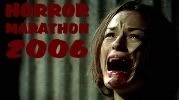
Despite the departure of Nicole Kidman and James Caan (and the subsequent replacement by Bryce Dallas Howard and Willem Dafoe) and the passage of several years since
Dogville,
Manderlay continues the same path without missing a beat, although it begs the question of whether this slightly different material merited the same minimalist style as its predecessor. Surely a trilogy (to be concluded with
Wasington - that's right, no "h") that largely concerns itself with the superficiality of appearances wouldn’t itself need to conform to a continuous thread of visual similarity, but perhaps this is less a case of misused devices than it is merely an acknowledgment of how exceedingly well
Dogville employed the same challenging approach. Grace (now played by a red-haired Howard) and her father’s roving gangsters have just left (after having obliterated) Dogville, and, traveling through the heartland of America, happen upon an enclosed plantation where, over seventy years after the abolition of slavery, the practice is still very much in full swing. Her guilty liberal attitude in full upswing, Grace uses her familial power to correct these discovered ills, although it quickly becomes apparent that, her best intentions notwithstanding, she isn’t entirely able to convert these sheltered negroes into equal, democratic citizens; habit and ingrained mentalities initially caused by enslavement linger long after freedom has been bestowed. In this regard,
Manderlay outdoes almost any recent effort of late when it comes to deconstructing racial relations in America (I’m talking to you,
Crash), even if it does so on a relatively specific historical level. The artificial aesthetic of the film is less overtly handled this time around (if I recall, only once did a character mime knocking on an invisible door), but nor do its events conclude with the same wrenching aplomb, all in all making for a slightly more ponderous – if less dramatically satisfying – example of a Von Trier puppet show.




 Despite the departure of Nicole Kidman and James Caan (and the subsequent replacement by Bryce Dallas Howard and Willem Dafoe) and the passage of several years since Dogville, Manderlay continues the same path without missing a beat, although it begs the question of whether this slightly different material merited the same minimalist style as its predecessor. Surely a trilogy (to be concluded with Wasington - that's right, no "h") that largely concerns itself with the superficiality of appearances wouldn’t itself need to conform to a continuous thread of visual similarity, but perhaps this is less a case of misused devices than it is merely an acknowledgment of how exceedingly well Dogville employed the same challenging approach. Grace (now played by a red-haired Howard) and her father’s roving gangsters have just left (after having obliterated) Dogville, and, traveling through the heartland of America, happen upon an enclosed plantation where, over seventy years after the abolition of slavery, the practice is still very much in full swing. Her guilty liberal attitude in full upswing, Grace uses her familial power to correct these discovered ills, although it quickly becomes apparent that, her best intentions notwithstanding, she isn’t entirely able to convert these sheltered negroes into equal, democratic citizens; habit and ingrained mentalities initially caused by enslavement linger long after freedom has been bestowed. In this regard, Manderlay outdoes almost any recent effort of late when it comes to deconstructing racial relations in America (I’m talking to you, Crash), even if it does so on a relatively specific historical level. The artificial aesthetic of the film is less overtly handled this time around (if I recall, only once did a character mime knocking on an invisible door), but nor do its events conclude with the same wrenching aplomb, all in all making for a slightly more ponderous – if less dramatically satisfying – example of a Von Trier puppet show.
Despite the departure of Nicole Kidman and James Caan (and the subsequent replacement by Bryce Dallas Howard and Willem Dafoe) and the passage of several years since Dogville, Manderlay continues the same path without missing a beat, although it begs the question of whether this slightly different material merited the same minimalist style as its predecessor. Surely a trilogy (to be concluded with Wasington - that's right, no "h") that largely concerns itself with the superficiality of appearances wouldn’t itself need to conform to a continuous thread of visual similarity, but perhaps this is less a case of misused devices than it is merely an acknowledgment of how exceedingly well Dogville employed the same challenging approach. Grace (now played by a red-haired Howard) and her father’s roving gangsters have just left (after having obliterated) Dogville, and, traveling through the heartland of America, happen upon an enclosed plantation where, over seventy years after the abolition of slavery, the practice is still very much in full swing. Her guilty liberal attitude in full upswing, Grace uses her familial power to correct these discovered ills, although it quickly becomes apparent that, her best intentions notwithstanding, she isn’t entirely able to convert these sheltered negroes into equal, democratic citizens; habit and ingrained mentalities initially caused by enslavement linger long after freedom has been bestowed. In this regard, Manderlay outdoes almost any recent effort of late when it comes to deconstructing racial relations in America (I’m talking to you, Crash), even if it does so on a relatively specific historical level. The artificial aesthetic of the film is less overtly handled this time around (if I recall, only once did a character mime knocking on an invisible door), but nor do its events conclude with the same wrenching aplomb, all in all making for a slightly more ponderous – if less dramatically satisfying – example of a Von Trier puppet show.




